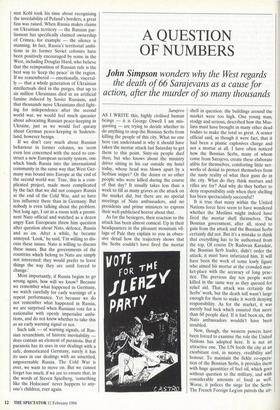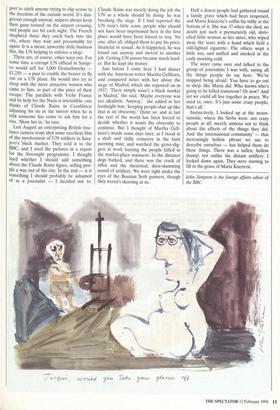A QUESTION OF NUMBERS
John Simpson wonders why the West regards the death of 66 Sarajevans as a cause for action, after the murder of so many thousands
Sarajevo AS I WRITE this, highly civilised human beings — it is George Orwell I am mis- quoting — are trying to decide whether to do anything to stop the Bosnian Serbs from killing the people of this city. What no one here can understand is why it should have taken the mortar attack last Saturday to get them to this point. Sixty-six people died then; but who knows about the ministry driver sitting in his car outside my hotel today, whose head was blown apart by a Serbian sniper? Or the dozen or so other people who were killed during the course of that day? It usually takes less than a week to fill as many graves as the attack on the market did, but there are no special meetings of Nato ambassadors, and no presidents and prime ministers to express their well-publicised horror about that.
As for the besiegers, their reaction to the attack has been almost comical. Up in their headquarters in the pleasant mountain vil- lage of Pale they explain to you in obses- sive detail how the trajectory shows that the Serbs couldn't have fired the mortar shell in question: the buildings around the market were too high. One young man, stodgy and serious, described how the Mus- lims must have brought in many other dead bodies to make the total so great. A senior official said, as though it were fact, that it had been a plastic explosives charge and not a mortar at all. I have often noticed how the Bosnian Serbs, many of whom come from Sarajevo, create these elaborate alibis for themselves, comforting little net- works of denial to protect themselves from the nasty reality of what their guns do in the city. What do they think mortars and rifles are for? And why do they bother to deny responsibility only when their shelling has been spectacularly successful?
It is true that many within the United Nations force here seem to have wondered whether the Muslims might indeed have fired the mortar shell themselves. The Bosnian government, after all, stood to gain from the attack and the Bosnian Serbs certainly did not. But it's a mistake to think that everything has to be authorised from the top. Of course Dr Radovan Karadzic, the Bosnian Serb leader, didn't order the attack; it must have infuriated him. It will have been the work of some lowly figure who aimed his mortar at the crowded mar- ket-place with the accuracy of long prac- tice. The previous day ten people were killed in the same way as they queued for relief aid. That attack was certainly the Serbs' work, but the death toll wasn't large enough for them to make it worth denying responsibility. As for the market, it was merely bad luck which ensured that more than 60 people died. If it had been six, the Nato ambassadors wouldn't have been troubled.
Now, though, the western powers have been forced to examine the role the United Nations has adopted here. It is not an attractive one. The UN feeds the city at an exorbitant cost, in money, credibility and honour. To maintain the fickle co-opera- tion of the Bosnian Serbs, it provides them with huge quantities of fuel oil, which goes without question to the military, and with considerable amounts of food as well Worse, it polices the siege for the Serbs. The French Foreign Legion patrols the air- port to catch anyone trying to slip across to the freedom of the outside world. It's dan- gerous enough anyway: snipers always keep their guns trained on the airport crossing, and people are hit each night. The French shepherd those they catch back into the city, where they wait and presumably try again. It is a mean, unworthy little business this, the UN helping to enforce a siege.
There are, of course, other ways out. For some time a corrupt UN official in Saraje- vo would sell for 3,000 Deutschmarks £1,250 — a pass to enable the bearer to fly out on a UN plane. He would also try to sleep with the more attractive women who came to him, as part of the price of their escape. The parallels with Vichy France and its help for the Nazis is irresistible: one thinks of Claude Rains in Casablanca adjusting his tie in the mirror when he is told someone has come to ask him for a visa. 'Show her in,' he says.
Last August an enterprising British free- lance camera team shot some excellent film of the involvement of UN soldiers in Sara- jevo's black market. They sold it to the BBC, and I used the pictures in a report for the Newsnight programme. I thought hard whether I should add something about the Claude Rains figure, selling peo- ple a way out of the city. In the end — it is something I should probably be ashamed of as a journalist — I decided not to. Claude Rains was merely doing the job the UN as a whole should be doing: he was breaking the siege. If I had reported the UN man's little scam, people who should not have been imprisoned here in the first place would have been forced to stay. No one, after all, obliged them to pay his price, financial or sexual. As it happened, he was found out anyway and moved to another job. Getting UN passes became much hard- er. But he kept the money.
Just before I came here I had dinner with the American writer Martha Gellhorn, and compared notes with her about the siege of Madrid, which she reported on in 1937. 'There simply wasn't a black market in Madrid,' she said. 'Maybe everyone was too idealistic. Anyway,' she added in her forthright way, 'keeping people shut up like that is an obscenity.' Quite so: and at last the rest of the world has been forced to decide whether it wants the obscenity to continue. But I thought of Martha Gell- horn's words some days later, as I stood in a drab and chilly cemetery in the faint morning mist, and watched the grave-dig- gers at work burying the people killed in the market-place massacre. In the distance dogs barked, and there was the crack of rifles and the theatrical, door-slamming sound of artillery. We were right under the eyes of the Bosnian Serb gunners, though they weren't shooting at us. Half a dozen people had gathered round a family grave which had been reopened, and Maria Knezevic's coffin lay tidily at the bottom of it. She was 37 when she died, no doubt just such a prematurely old, shriv- elled little woman as her sister, who wiped away the tears with a hand which held a still-lighted cigarette. The others wept a little too, and sniffed and smoked in the early morning cold.
The sister came over and talked to the group of journalists I was with, saying all the things people do say here: 'We've stopped being afraid. You have to go out to shop, like Maria did. Who knows who's going to be killed tomorrow? Or now? And yet we could all live together in peace. We used to, once. It's just some crazy people, that's all.'
Instinctively, I looked up at the moun- tainside, where the Serbs were: not crazy people at all; merely anxious not to think about the effects of the things they did. And 'the international community' — that increasingly hollow phrase we use to describe ourselves — has helped them do these things. There was a sullen, hollow thump, not unlike the distant artillery. I looked down again. They were starting to fill in the grave of Maria Knezevic.
John Simpson is the foreign affairs editor of the BBC.



















































 Previous page
Previous page